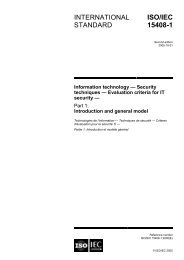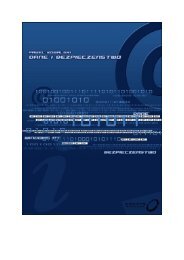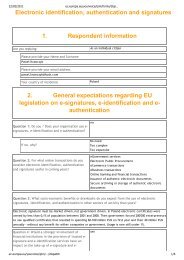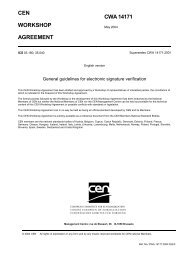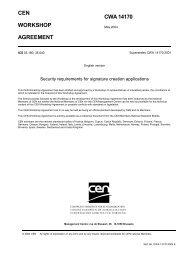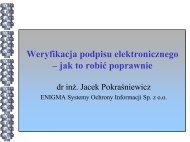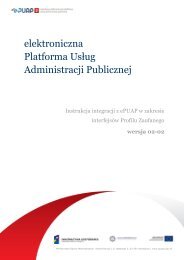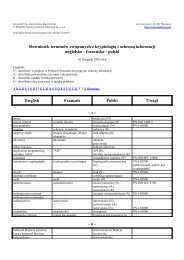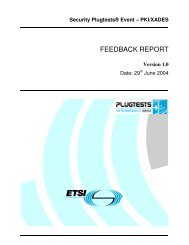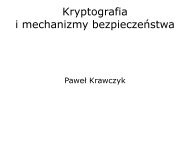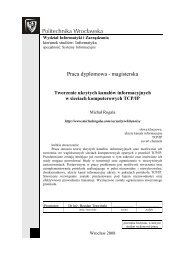When electronic signature becomes a information services ... - IPSec
When electronic signature becomes a information services ... - IPSec
When electronic signature becomes a information services ... - IPSec
You also want an ePaper? Increase the reach of your titles
YUMPU automatically turns print PDFs into web optimized ePapers that Google loves.
Neither of these technical design attributes was caused by the need for security, but rather by<br />
the immaturity of the underlying technology. On the other hand, vendors did not consider such<br />
issues as of any relevance. For instance, the administration offices in Poland were required to<br />
buy or outsource the Internet document gateway (ESP) in relatively short time, it was formal<br />
compliance with law that was a priority, not the ease of use, even if the average citizen could<br />
not use the software. 32<br />
The conclusion is, that regardless of the optimistic visions of digital <strong>signature</strong>s that are<br />
presented to users, the technology will not work if the underlying technologies are not mature<br />
enough to provide stable products that can be used by lay people. Where the user has the choice<br />
of ugly, counter-intuitive but highly secure applications that only allowed them to produce a<br />
qualified <strong>electronic</strong> <strong>signature</strong>, or their popular office applications that were not considered<br />
approved for QES, the users simply voted with their feet. The failure for the QES to be taken<br />
up by users has nothing to do with lack of trust in the Internet or old habits, because the same<br />
people use the Internet to buy and sell (auctions, food, clothes, holidays, air travel, to name but<br />
a few) and use Internet banking all the time. 33<br />
The provisions relating to the QES in Directive 1999/93/EC provide an imperfect attempt at<br />
providing for an almost totally secure method of <strong>electronic</strong> <strong>signature</strong>. But those responsible for<br />
producing the QES fail to understand that the practical issues for both people and business<br />
centre around weighting the cost and benefits of a specific technical product. The QES, which<br />
is very expensive and a burden to use, provides highly sophisticated protection against attacks<br />
that are not very relevant for most e-commerce use 34 – indeed, the QES level of security was<br />
often figuratively demonstrated by comparison with the notary <strong>services</strong>. 35<br />
The qualified <strong>electronic</strong> <strong>signature</strong> as an <strong>information</strong> <strong>services</strong> preventer [Heading]<br />
The qualified <strong>electronic</strong> <strong>signature</strong> provides a very high level of security: it offers authenticity,<br />
integrity and non-repudiation (non-repudiation means that it can be demonstrated that software<br />
32<br />
Paweł Krawczyk, ‘Ekscytująco prosta w użyciu skrzynka podawcza Zeto Białystok’, 21 February 2008, article published at<br />
<strong>IPSec</strong>.pl and available at http://ipsec.pl/podpis-elektroniczny/2008/ekscytujaco-prosta-w-uzyciu-skrzynka-podawcza.html.<br />
33<br />
Number of e-banking users in Poland will probably reach 10 million in 2010, being roughly one quarter of the whole population:<br />
the 2008 prognoses is provided by Związek Banków Polskich (Association of Polish Banks).<br />
34<br />
Who cares about strong non-repudiation and long-term <strong>signature</strong> validity when requesting a simple certificate of residence or<br />
issuing an invoice? For a discussion about non-repudiation in a legal context (there is no such term in law, and the term has no meaning in<br />
law), see Stephen Mason, Electronic Signatures in Law (2nd edn, Tottel, 2007) 14.20.<br />
35<br />
Piotr Kolodziejczyk, ‘To prawo i brak chęci blokują rozwój e-administracji’, Gazeta Wyborcza, 29 June 2008; the comparison was<br />
not actually a legal or technical equation of notary <strong>signature</strong> and QES, but rather a figurative demonstration of the levels of the strength of<br />
security; this argument was often used against proponents of QES for e-invoicing who claimed that security is the priority. Opponents argued<br />
that if security is a priority, all paper invoices should perhaps be signed before a notary.



